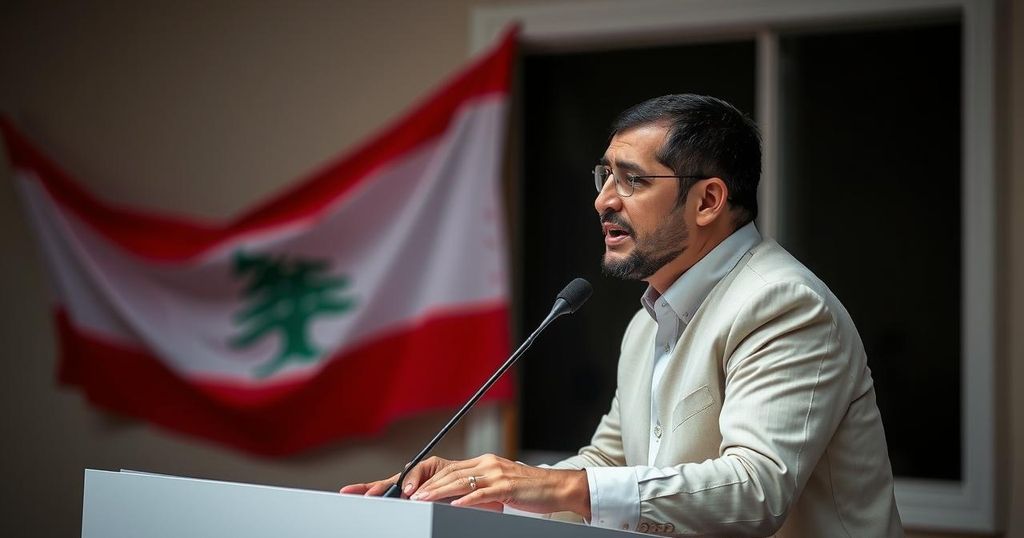Lebanon’s Upcoming Presidential Election: A Hope for Stability and Governance

Lebanon is poised to hold a presidential election on Thursday after two years without a functional leader. The election is crucial for establishing a government that can address the nation’s political and economic crises, particularly in light of a new ceasefire agreement between Israel and Hezbollah. Joseph Aoun emerges as a strong candidate, potentially backed by various political factions, emphasizing the need for a new beginning in Lebanon’s governance.
Lebanon has been without a functional president for over two years, but the situation may change with the upcoming presidential election scheduled for Thursday. The current transitional government, led by Prime Minister Najib Mikati, lacks sufficient power to resolve the pressing political and economic challenges facing the country. The recent ceasefire agreement between Israel and Hezbollah lays the groundwork for an election aimed at stabilizing Lebanon under a credible executive capable of implementing this agreement before its expiration at the end of January.
The nation is grappling with multi-faceted crises, including a severe economic downturn characterized by frozen bank deposits and a depreciating currency, amid the aftermath of conflict that has devastated infrastructure. It is paramount that the government consolidates the ceasefire while addressing the return of approximately 1.3 million internally displaced individuals and the repatriation of Syrian refugees. As Michael Bauer, head of the Beirut office of the Konrad Adenauer Foundation, stated, “The situation is dramatic in many respects,” emphasizing that simply establishing a consensus candidate will not suffice.
Intense negotiations among Lebanon’s diverse political factions have intensified as the election date approaches. The parliament’s structure is influenced by the confessional system, which designates critical political roles based on religious affiliation. Currently, Joseph Aoun, commander-in-chief of the armed forces and a Maronite Christian, emerges as a favored candidate with potential support from various factions. Hezbollah’s recent willingness to consider Aoun over their initial preferred candidate, Sleiman Frangieh, is a noteworthy development that reflects a shift in the political landscape following recent conflicts.
Aoun’s military background lends him the trust of the Lebanese people, as he heads one of the country’s most respected institutions, the Lebanese Armed Forces. His candidacy signals hope for a fresh force in leadership, capable of addressing urgent security challenges. As Ronnie Chatah highlights, the dynamics have shifted, making Aoun’s election a probable outcome, as Hezbollah’s objections appear to have lessened.
Ultimately, the imperative is for Lebanon to elect a president who can restore legitimacy and function to the government, as Chatah concluded: “All those are prerequisites for Lebanon to function as a state.” This election represents a pivotal moment for the nation, offering the first viable opportunity for establishing a legitimate executive authority in two years.
Lebanon’s political landscape has been unstable, marked by a lack of presidential leadership over the past two years, which has severely hindered the government’s capacity to address ongoing crises. The country has been engaged in an economic recession, with critical infrastructure damaged by conflict. The recent ceasefire between Israel and Hezbollah injects urgency into the election process, as a new president is needed to implement agreements and navigate the complexities of returning displaced citizens and addressing the refugee situation. This election is framed within Lebanon’s traditional confessional system, requiring cooperation among a diverse array of political and religious factions.
In conclusion, the upcoming presidential election in Lebanon presents a critical juncture for the nation, with the potential to restore effective governance and address pressing socioeconomic challenges. A favorable outcome, particularly with the candidacy of Joseph Aoun, may foster stability and credibility, a necessity for the state’s functioning amidst severe crises. This election not only represents a chance for renewed leadership but also offers hope for the Lebanese people to reclaim their agency in governance after years of uncertainty.
Original Source: www.dw.com








